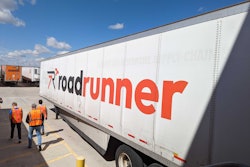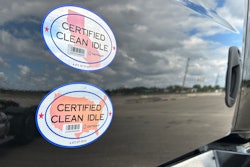Trucking news and briefs for Monday, Nov. 25, 2024:
CargoNet warns of Thanksgiving theft increase
 During the last five Thanksgiving holiday periods, CargoNet has tracked 174 theft incidents worth an average of nearly $160,000 each.CargoNet
During the last five Thanksgiving holiday periods, CargoNet has tracked 174 theft incidents worth an average of nearly $160,000 each.CargoNet
As happens around most major holidays -- with trucks and freight sitting longer than normal -- cargo theft recording firm CargoNet is warning the industry of increased theft activity during the upcoming Thanksgiving period.
The firm’s analysis of supply chain intelligence found 174 significant theft events during a critical six-day window from the Tuesday before Thanksgiving through the following Monday over the past five years. Criminals targeted semi-tractors, trailers, and cargo through various schemes, including identity fraud.
CargoNet analysts identified the Monday following Thanksgiving as the peak day for criminal activity, coinciding with a surge in identity fraud complaints. Thieves appear to exploit both the extended holiday closure and decreased vigilance following the holiday weekend.
A geographic analysis showed clear concentrations of criminal activity. San Bernardino County and Los Angeles County in California, along with Cook County in Illinois, emerged as the primary hotspots during this period.
[Related: 2025 cybersecurity issues in trucking]
CargoNet’s investigation of targeted commodities found consistent patterns in thief preferences. Criminals focused primarily on freight all-kinds (FAK) shipments, hard liquor, and vehicle accessories, particularly tires and motor oil. Historical cases demonstrate that thieves select these targets based on established relationships with black market buyers, indicating sophisticated criminal networks operating within the supply chain.
The evolution of criminal methodology presents an ongoing challenge. While carriers, brokers and shippers successfully prevent many traditional identity fraud attempts, criminals continue to advance their techniques, CargoNet said. The firm has already recorded more than 450 so-called "fictitious pickup" attempts in 2024, which is on pace to exceed last year's record levels.
The Thanksgiving holiday period creates uniquely vulnerable conditions throughout the supply chain, as extended facility closures combine with reduced staffing levels to disrupt normal operating patterns. These factors create opportunities for criminal exploitation that require enhanced vigilance and security protocols.
CargoNet strongly recommends transportation companies strengthen their security measures throughout the holiday period. Companies should implement additional verification steps for all shipments, particularly those moving through identified high-risk areas. Special attention should focus on protecting frequently targeted commodities and preventing identity fraud schemes.
[Related: Cargo theft continues to rise over 2023 numbers]
CARB approves $35M in incentives for small-fleet ZEV transition
The California Air Resources Board (CARB) on Nov. 21 approved a $34.94 million incentives funding plan aimed at increasing access to medium- and heavy-duty “zero-emission” trucks, buses, and equipment, with a focus on small businesses.
The 2024-‘25 Funding Plan for Clean Transportation Incentives increases funding for small businesses that want to modernize their fleets with cleaner vehicles, including assistance for rentals, leases and truck loans, CARB said. The funding plan allocates existing legislative funds toward incentive projects that support the state’s air quality and climate goals, including for marine vessels, emerging technologies and zero-emission off-road equipment, such as freight, construction and agricultural equipment.
“The funding plan reflects the key steps we need to take to advance our clean air goals, which include continued support of small businesses that may face financial obstacles switching to zero-emission options,” said CARB Chair Liane Randolph. “Reducing pollution means ensuring that all Californians have access to the cleanest technology options available.”
The funding plan was informed by an extensive outreach process to help determine priorities. Highlights include:
- $5 million for the Zero-Emission Truck Loan Pilot project to help fleets purchase “zero-emission” medium- and heavy-duty trucks. The project is offered in partnership with the California Energy Commission, which provides loan support for charging and other zero-emission fueling infrastructure.
- $14.97 million for the Innovative Small e-Fleet Pilot Project, which provides vouchers for medium- and heavy-duty vehicles for small businesses and other organizations with 20 or fewer vehicles.
- $14.97 million for the Clean Off-Road Equipment Project that helps businesses purchase zero-emission off-road equipment such as forklifts and cargo loaders.
Saia opens sixth Michigan terminal
Saia Inc. (CCJ Top 250, No. 19) announced that Saia LTL Freight opened its newest terminal in Warren, Michigan, last week.
The new facility will provide enhanced service to customers in the Warren market through reduced transit times and more efficient freight handling, the company said.
“We’re excited to expand our Michigan operations from five facilities to six with this new terminal in Warren,” said Executive Vice President of Operations Patrick Sugar. “This addition strengthens our ability to deliver faster and reliable service for customers, ensuring that we can meet the growing demand for quality freight solutions in the Midwest.”
By increasing capacity and optimizing freight movement, the facility will further improve Saia’s presence in Michigan, allowing the company to set higher service standards for its customers.
[Related: Saia celebrating 100th anniversary]
Crude oil transportation fleet seeks waiver to add pulsating brake light module
Following similar requests from a number of fleets, Oklahoma-based Coffeyville Resources Crude Transportation is petitioning the Federal Motor Carrier Safety Administration for a waiver to allow it to install the Intellistop pulsating brake light module on its trucks.
The Intellistop module pulses the rear clearance, identification, and brake lamps from low-level lighting intensity to high-level lighting intensity four times in two seconds when the brakes are applied.
An exemption is required to install the module because federal regulations require that all exterior lamps be steady burning, except for turn signal lamps, hazard warning signal lamps, school bus warning lamps, amber warning lamps or flashing warning lamps on tow trucks and CMVs transporting oversized loads, and warning lamps on emergency and service vehicles authorized by state or local authorities.
In Coffeyville’s request, the company said the “pulsing the rear brake lamps of a CMV may significantly increase visibility and reduce the frequency of rear-end crashes, and thus would maintain a level of safety that is equivalent to, or greater than, the level that the CMV would achieve without the requested exemption.”
FMCSA is accepting comments on the request here through Dec. 23.
[Related: Tanker fleet gets limited exemption to install pulsating brake light system]










